By Jeffrey Sanzel
The Faust story continually appears on stage and screen. Whether complicit or duped, someone—almost always a man—makes a deal with a satanic figure in exchange for a particular gratification. All That Money Can Buy (also known as The Devil and Daniel Webster) and Angel Heart exemplify the darker side. Damn Yankees!, Bedazzled (the original 1967 and its 2000 remake), and Oh, God! You Devil skew lighter. Now on Amazon Prime, Candy Cane Lane is a guileless, uninspired take on the legend.
Just days before Christmas, Chris Carver (Eddie Murphy) is part of a callous layoff by California’s Sydel Twain Industrial Plastics. Simultaneously, the already cut-throat neighborhood decorating competition receives a boost from local Prism Cable, offering $100,000 for the most festive house. Year after year, Chris has decked his home and yard with beautifully carved and hand-crafted pieces but has consistently lost to his shrill neighbors, Bruce and Suz (Ken Marino and Riki Lindhome), who populate their dwelling with crass inflatables.
Determined to win the prize, Chris happens upon the mysterious Kringle’s, a Christmas shop located beneath an underpass, looking much like the toy store in Jingle Jangle. The proprietor, an elf named Pepper (Jillian Bell), coaxes Chris into a trove of large purchases. Chris signs the receipt without reading the fine print, a sinister contract that will turn him into one of her animated glass ornaments. The centerpiece of the decorations is a massive “Twelve Days of Christmas” Tree, which comes to life. Most of the film is taken up with the chase to acquire the “Golden Rings” that will break the spell.
The premise is simple, and the action is predictable. Murphy is pleasantly understated and once again proves his easy, likable charm. Tracee Ellis Ross plays his wife, Carol, an executive on the cusp of a big promotion. She demonstrates the same wry command she showed in the series Blackish (basically the same character). They have three children: college-bound Joy (Genneya Walton), a struggling student but gifted musician Nick (Thaddeus J. Mixson), and the sweet, innocent youngest Holly (Madison Thomas). The older two children harbor secrets, which, when revealed, help solve the challenges the family faces. (Please note the lack of subtlety: Chris, Carol, Joy, Nick, Holly.)
Chris is aided and advised by three of Pepper’s previous victims, now glass figurines: Pip, Lamplighter Gary, and Cordelia (voiced by Nick Offerman, Chris Redd, and Robin Thede, respectively). The vocal group Pentatonix is a nice touch, as out-of-control carolers who are also under the enchantment.
The major problems with Candy Cane Lane are Kelly Younger’s meandering script and Reginald Hudlin’s pedestrian direction. Neither committed to a tone or style, with constant shifts from traditional holiday fare to fantasy to topical satire to family drama to slapstick to sitcom to … occasional flashes of genuine wit nod toward the premise’s possibility.
Prism hosts Emerson (Timothy Simons) and Kit (Danielle Pinnock) are genuinely funny, especially in the revelation of the prize status. A chaotic glimpse of Walmart followed by Target is smartly perceptive. A Hannukah house tops a Matrix-themed home in outrageousness. But these sparks get lost in the boomerang of treacly messages.
The film relies mostly on Murphy and Ross’s chemistry, along with some nice effects. The children play as many shades as possible within the limitations of the writing. Bell seems lost as Pepper, not finding the fun in her villain. “What’s Christmas without a little terror?” stated as the true meaning of the holiday seems unsure. Her joke about “human-splaining Christmas” falls flat. One wishes she was allowed to let loose rather than play Pepper like a Saturday morning children’s show baddy. Redd is hilarious as Lamplighter Gary, landing some of the biggest laughs. David Alan Grier smartly assays his contemporary Santa with just the right amount of wink.
A track meet dealing with “The Ten Lords a Leaping” and a quick debate about Die Hard as a Christmas movie furnish nice moments. (Though the “Maids a Milking” has an uncomfortable horror movie edge.) And the payoff of the “Five Golden Rings” contains genuine heart.
Ultimately, the biggest problem is the sluggish pacing. Additionally, the film would have benefited from a shorter running time. Eighty minutes of break-neck whimsy would have played better than the nearly two hours of fits and starts. A mathematical loophole in Pepper’s contract adds twenty-plus minutes for a labored farcical finale.
While benign if slightly saccharine, Candy Cane Lane is destined to be a lesser seasonal offering, an empty stocking to be packed away and forgotten.

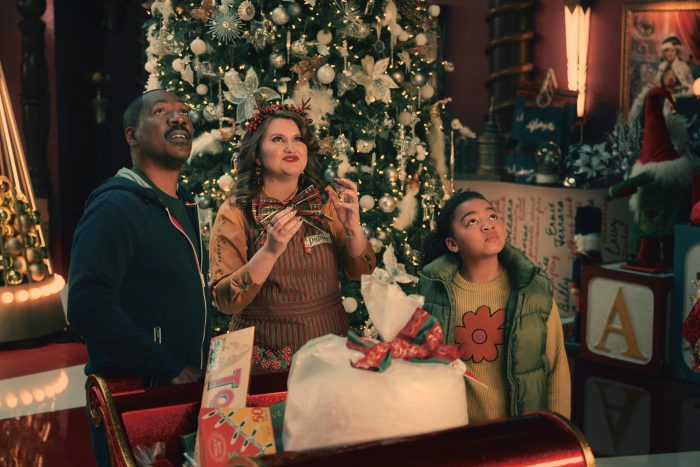

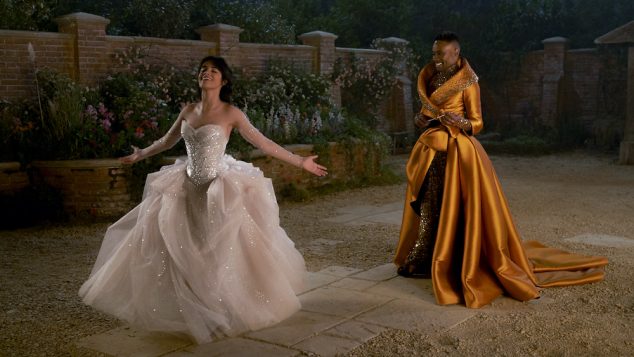
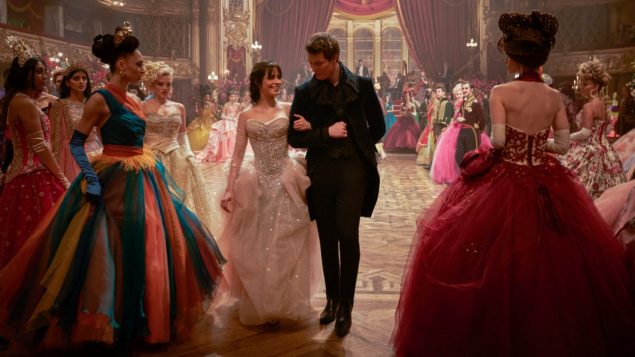

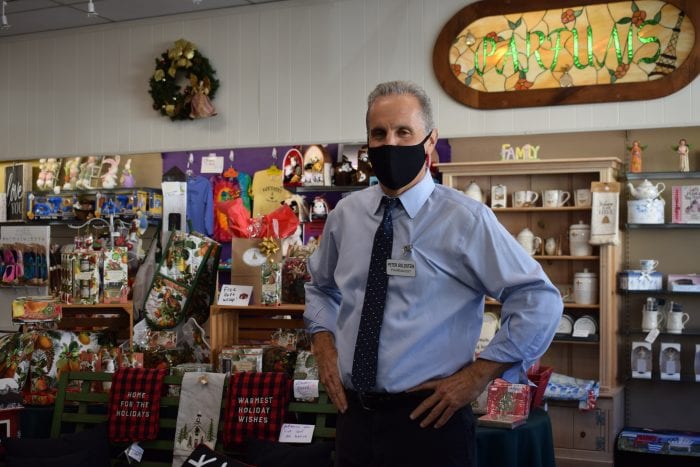



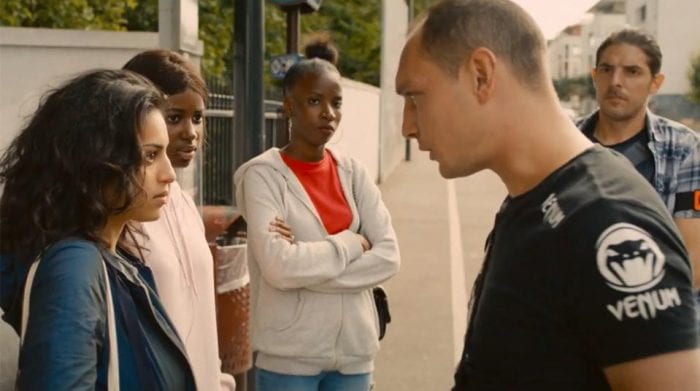
 Quickly, the action shifts to Les Bosquets, Montfermeil’s most notorious and crime-ridden social estate. Police officer Stéphane Ruiz, an emotional and moral core as played in a brooding, heartfelt performance by Damien Bonnard, has arrived for his first day, having been transferred from Paris, to join the anti-crime brigade. He is placed with the high-strung, abusive, and sadistic Chris (Alexis Manenti, dangerously mercurial) and the more laid-back Gwada (understated but wholly engaging Djebril Zonga), who grew up in the neighborhood.
Quickly, the action shifts to Les Bosquets, Montfermeil’s most notorious and crime-ridden social estate. Police officer Stéphane Ruiz, an emotional and moral core as played in a brooding, heartfelt performance by Damien Bonnard, has arrived for his first day, having been transferred from Paris, to join the anti-crime brigade. He is placed with the high-strung, abusive, and sadistic Chris (Alexis Manenti, dangerously mercurial) and the more laid-back Gwada (understated but wholly engaging Djebril Zonga), who grew up in the neighborhood. Even after they locate Issa, it is an act of violence — revealed to be not as accidental as it first seems — that drives the latter part of the film. From then on, it is a race between the police officers and the various residents to track down the video from Buzz (wide-eyed and fearful Al-Hassan Ly), the boy whose drone recorded the incident. It all builds to a showdown that is both a literal and figurative conflagration.
Even after they locate Issa, it is an act of violence — revealed to be not as accidental as it first seems — that drives the latter part of the film. From then on, it is a race between the police officers and the various residents to track down the video from Buzz (wide-eyed and fearful Al-Hassan Ly), the boy whose drone recorded the incident. It all builds to a showdown that is both a literal and figurative conflagration.


